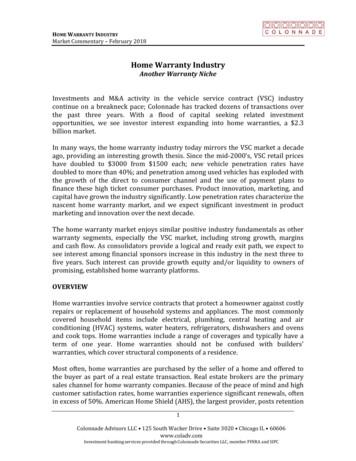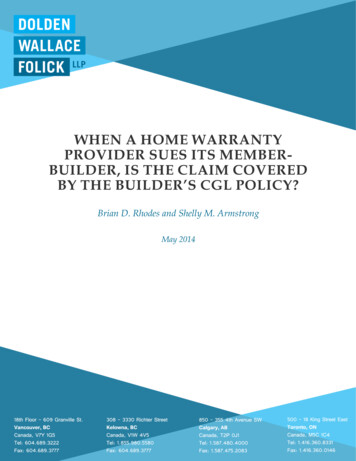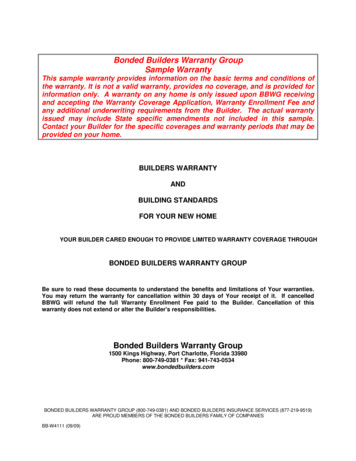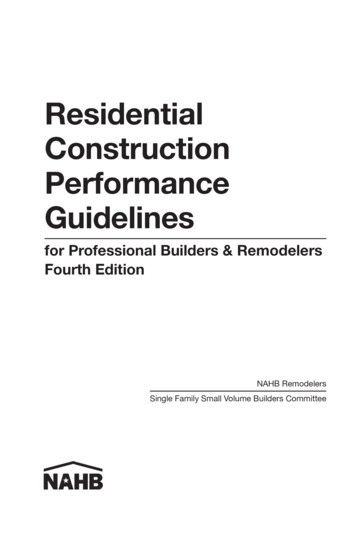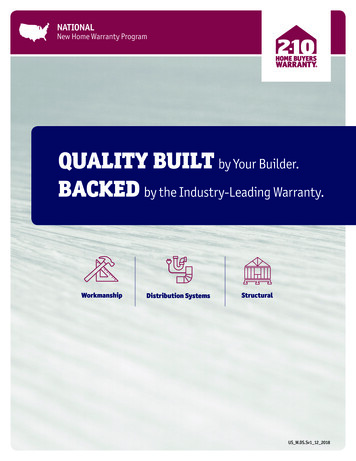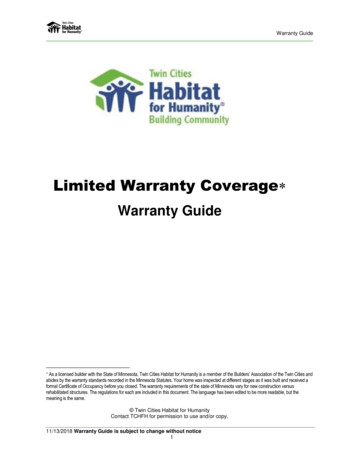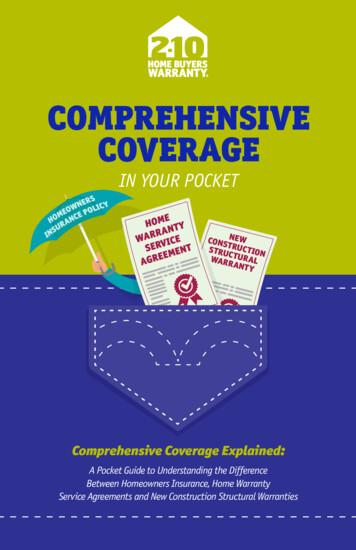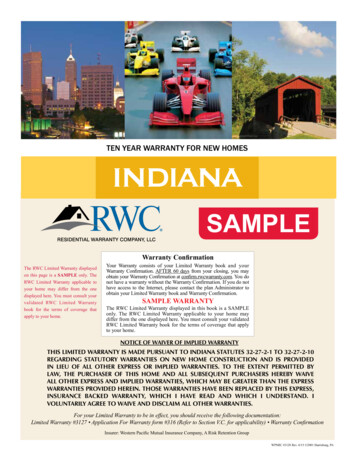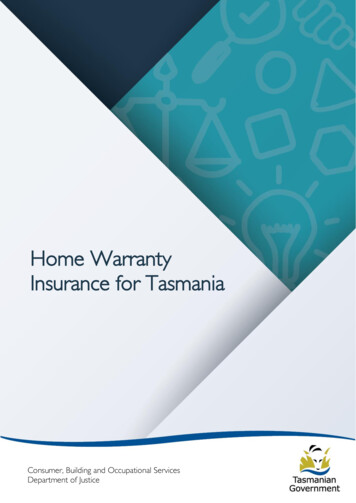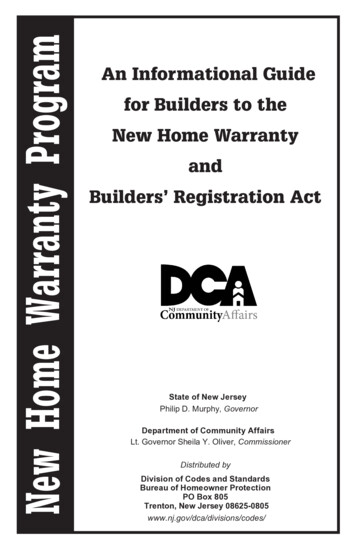
Transcription
New Home Warranty Program-An Informational Guidefor Builders to theNew Home WarrantyandBuilders’ Registration ActState of New JerseyPhilip D. Murphy, GovernorDepartment of Community AffairsLt. Governor Sheila Y. Oliver, CommissionerDistributed byDivision of Codes and StandardsBureau of Homeowner ProtectionPO Box 805Trenton, New Jersey 08625-0805www.nj.gov/dca/divisions/codes/
IntroductionBeing a builder in New Jersey means so much more thansite planning, framing and sheet rocking. You are helpingshape a future for many New Jersey families.This brochure highlights the requirements of the NewHome Warranty and Builders’ Registration Act to help youunderstand your responsibilities as a builder in our State. Itincludes information about how to register for the New HomeWarranty Program and highlights what warranties cover toensure New Jersey’s families have the best quality of work fortheir homes.New Jersey’s builders are an important asset to oureconomy and to the communities we create for ourhardworking families. We hope you find this brochure usefulas you work to help us build a better New Jersey –one home ata time.
OVERVIEWThe New Home Warranty and Builders’ Registration Act (NJSA 46:3B-1etseq) was enacted in 1977. It requires that new homebuilders register withthe New Jersey Department of Community Affairs (DCA) and warrant allnew homes sold to or built for their customers. The Act specifies builders’responsibilities to warrant their work, ensuring an acceptable quality ofmaterials and workmanship, performance of heating, air conditioning,plumbing and electrical systems, and structural integrity of new homes.The law established the State of New Jersey New Home WarrantySecurity Fund to guarantee builder warranties. It also provides for DCAapproval of private warranties as alternatives to the State warranty plan.Finally, the law requires that new homebuilder warranties include amethod for resolving disputes over warranty coverage as an alternative tocivil litigation through the courts. In the event that a builder does not makerepairs on claims for which the builder has been found responsible forthrough the dispute settlement process, the New Jersey New Home WarrantySecurity Fund, or the private alternate warranty security fund, will pay thecost of the repairs for homeowners.3
Registration for theNew Home Warranty ProgramWho must register?All builders of owner-occupied new homes, including single-family,townhouse, duplex, cooperative, condominium, factory built and modularresidences are required to register with the New Home Warranty Program.Each new home building business is required to register separately. Thename of the entity that is transferring title to the new home is the entity thatmust warrant the new home.Definitions A “new homebuilder” is defined as any individual, partnerships,corporation or any business entity engaged in the construction of newhomes. It also is those who contract with a general or subcontractor forthe construction of a new home for the purpose of sale to an owner. The “business” of constructing new homes includes:o Constructing any new home for sale or advertising, or holdingoneself out as constructing or being available to construct newhomeso The sale or transfer of land to any person and the subsequentparticipation in the construction of a new home or any part of anew home by the seller or transferorNo person shall be permitted to construct a new home for their ownuse and occupancy more often than once every five years without beingregistered as a new homebuilder.4
The Registration ProcessAll new homebuilders must submit a registration application, along witha 200 non-refundable registration fee, to the New Home Warranty Program.The registration fee is paid by check drawn on the account of the new homebuilding business or a principal of the new home building business.Corporations, limited partnerships, general partnerships, limited liabilitycompanies and joint ventures also must submit a copy of their applicablearticles of formation indicating the current officers and/or principals.If approved, a builder is issued a new homebuilder registration numberand card that is valid for two years from the approval date. This card mustbe shown to local construction officials when obtaining permits to constructa new home.Maintaining RegistrationA new homebuilder registration must be renewed every two years.Renewal requirements are the same as new registrations, including the 200non-refundable fee.Important Notes About RegistrationA new homebuilder must maintain a current registration as long as anyhomes warranted by the builder are in the first two years of coverage.Builders that fail to register or maintain a current registration are subjectto fines of up to 2,000. Each home sold during the time the builder remainsunregistered is considered a separate offense.Registration Suspension or RevocationA builder’s registration can be suspended or denied for such offensesas failing to maintain up-to-date information in the builder registration file;failing to properly enroll homes in an approved warranty plan; failing tosettle claims in accordance with the adopted procedures of the warrantyadministrator; not fully compensating the warranty plan for claim defaults,penalties and fees; failing to participate in the dispute settlement process; orhas a principal with a prior involvement with a suspended or revoked newhomebuilder.A builder’s registration can be revoked or denied because of fraud, grossnegligence in the practice of building new homes, substantial violations ofthe New Jersey Uniform Construction Code, or misrepresentation in theregistration application. A registration also can be revoked if a builderhabitually or egregiously engages in an act that would otherwise lead to asuspension.5
Warranty GuidelinesWarranty CoverageA builder’s liability under a warranty is limited by law to thepurchase price of the home in the first, good faith sale, or the fair marketvalue of the home on its completion date, if there is no good faith sale.For 10 years from the commencement date of the warranty, a newhome is covered against major structural defects. For the first two years, anew home is covered against defects in the design and delivery of heating,air conditioning, plumbing and electrical systems. During the first year,a new home is covered against defects in workmanship and materialsincluding appliances, fixtures and equipment.The builder is the warrantor of the new home and must performwarranty service during the first two years of coverage.Warranty SecurityAs a condition of registration, each new homebuilder is requiredto participate in a warranty guarantee program. A builder may applyfor acceptance in any one of the DCA-approved private warranty plansor automatically become a participant of the State of New Jersey NewHome Warranty Security Fund that is administered by DCA.Warranty ResponsibilitiesThe builder, or the warranty plan of which the builder is a member,is responsible for providing the homeowner with a full statement ofwarranty coverage and warranty claims procedures on forms preapproved by DCA. This transmittal should take place at closing, or ifthere is no transfer of title, when the builder delivers possession of thenew home to the owner. Proof of warranty coverage must be presentedby the builder to the local construction official prior to the issuance of acertificate of occupancy. The warranty commences upon first occupancyby the owner or the date of settlement, whichever is sooner.6
Warranty PlansPrivate Warranty PlansNew homebuilders can only fulfill their obligations to provide awarranty if it is issued through one of the DCA-approved private alternatenew home warranty security plans or the State of New Jersey New HomeWarranty Plan. Private plans must offer the same warranty coverage as theState Plan, but enrollment rates and other fees vary by plan. The New HomeWarranty Program can provide builders with a current list of approvedprivate warranty plans.Claims Resolution Process for Private PlansEach private plan must provide a complaint, claims and paymentprocedure that provides for an attempt at informal settlement between thebuilder and the homeowner of any dispute over coverage.The law requires conciliation and/or arbitration of any warranty claimdispute by an independent, third party, and the private plan must providefixed periods of time for action by the builder or homeowner, pursuant tothe arbitration/conciliation decision. For detailed information on the processused by a particular private warranty plan, a representative of the planshould be contacted.7
State Warranty PlanThe State Warranty Plan is open to all registered builders. Any buildernot participating in an approved private warranty plan is automaticallyenrolled in the State Plan. The rate for each new home enrolled is basedupon a builder’s warranty enrollment and dispute settlement records. Thecontribution percentage to be paid for each new home by a builder notparticipating in an approved private plan is as follows:1. If, for at least 10 years, there has been no payment made, and no finaldetermination that a payment must be made, under either the State Planor an approved private plan, as a result of a claim against the builder ora major structural defect, the contribution percentage shall be 0.17;2. If, for at least seven years, but less than 10 years, there has been nopayment made, and no final determination that a payment must bemade, under either the State Plan or an approved private plan, as aresult of a claim against the builder or a major structural defect, thecontribution percentage shall be 0.213;3. If, for at least five years, but less than seven years, there has been nopayment made, and no final determination that a payment must bemade, under either the State Plan or an approved private plan, as aresult of a claim against the builder or a major structural defect, thecontribution percentage shall be 0.255;4. If, for at least two years, but less than five years, there has been nopayment made, and no final determination that a payment must bemade, under either the State Plan or an approved private plan, as aresult of a claim against the builder or a major structural defect, thecontribution percentage shall be 0.298;5. If a builder has not previously been registered or has been registered forless than two years, and there has been no payment made and no finaldetermination that a payment must be made, under either the State Planor an approved private plan, as a result of a claim against the builder ora major structural defect, the contribution percentage shall be 0.319;6. If, within the previous two years, there has been any payment made, orany final determination that a payment must be made, under either theState Plan or an approved private plan, as a result of a claim against thebuilder or a major structural defect, the contribution percentage shall be0.425;8
7. If, at any time while a builder’s contribution percentage is in an amountdetermined in accordance with #6 in this list, by reason of the builder’shaving been responsible for a payment having to be made on a claimunder either the State Plan or an approved private plan, there is anyfurther payment made, or any final determination that a payment mustbe made, under either the State Plan or an approved private plan, as aresult of another claim against the builder or a major structural defect,or if a petition in bankruptcy filed by or against a builder and thebuilder has not yet been discharged or is under the supervision of thecourt, the contribution percentage shall be 0.595.These rates are not applicable if no new homes were enrolled duringthe specified time period. If the builder is under contract to a landownerwho is to occupy the home, the selling price is calculated at 125 percent,multiplied by the contract amount.If any principal in the new home building business is involved inany other new home building business with a less favorable rate, theless favorable rate applies to all new home building businesses that theprincipal is involved with.The rate assigned to the new home building business will be used tocompute the warranty premiums for each new home enrolled in the StatePlan. This rate will be adjusted upon renewal of the builder’s registration,when it will be revised based on the new home building business’ claimsrecord, or at any time the builder defaults on a claim.9
Claims Resolution Process for the State PlanUnless an emergency situation arises or a major structural defect exists,a homeowner must wait 120 days from the start date of the warranty beforea claim can be filed (Request for Dispute Settlement). The homeowner mustnotify the builder in writing and include a list of defects found in the home.The builder has the choice to repair, replace or pay for the correction of thedefects. The builder also is responsible for actual reasonable shelter expensesduring any repair that renders the home uninhabitable.The builder must inspect and repair the defect(s) covered by thewarranty within 30 days of the homeowner’s notice. If the builder does not,the homeowner may file a formal Notice of Claim and Demand with theNew Home Warranty Program. The New Home Warranty Program is thenresponsible for providing a means of claims resolution.The process begins with conciliation, in which a skilled, impartial,neutral third party meets with the builder and the homeowner at the newhome in an attempt to resolve the conflicts over coverage and performance.This neutral, third party is an independent conciliator/arbitrator. Ifconciliation is successful, the conciliator/arbitrator will, with permission ofboth parties, convert the agreement to an arbitration award. If conciliation isnot completely successful, the conciliator/arbitrator, with permission of bothparties, will proceed to arbitrate the dispute.As a result of the meeting, the arbitrator will render judgment withina few weeks. This award is legally binding on both parties. The awardis limited to a determination of the existence of an eligible defect underthe New Home Warranty regulations, whether the builder will repair orreplace the defect(s), and the time within which the builder will performthe corrective action. The arbitrator cannot make a monetary award, exceptin the case of reimbursement for emergency or temporary repairs. There isno cost to the homeowner or builder for conciliation or arbitration under theState Plan. The arbitration award is not appealable through the New HomeWarranty Program.If, after the conciliation step, either the homeowner or builder choosesnot to have the dispute settled through arbitration, the dispute will beresolved by a decision of the agency. A New Home Warranty claims analystis assigned to review the defects, apply the warranty standards and render awritten decision. The decision is binding on all parties, but can be appealedwithin 15 days of its transmittal. If appealed, an administrative hearingthrough the New Jersey Office of Administrative Law is held to resolve thewarranty dispute.If a builder refuses to repair or replace defects as directed in the writtenarbitration award or the agency decision, the State Plan assumes financialresponsibility for correction of the awarded defects.10
notes
DCA’s Division of Codes and Standards establishes and enforces codesfor buildings, structures or equipment, in partnership with New Jersey’smunicipalities, to protect the health and safety of New Jersey’s citizens.The Bureau of Homeowner Protection administers programs that areconcerned with the purchase of new homes, as well as units inretirement communities, condominiums and cooperatives.For additional information, contact:New Jersey Department of Community AffairsDivision of Codes and StandardsBureau of Homeowner ProtectionNew Home Warranty ProgramP.O. Box 805Trenton, N.J. 08625-0805(609) 984-7905www.nj.gov/dca/divisions/codes/June 2010
Home Warranty Security Fund that is administered by DCA. Warranty Responsibilities The builder, or the warranty plan of which the builder is a member, is responsible for providing the homeowner with a full statement of warranty coverage and warranty claims procedures on forms pre-approved by DCA. This transmittal should take place at closing, or if
